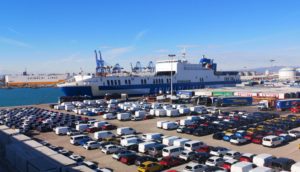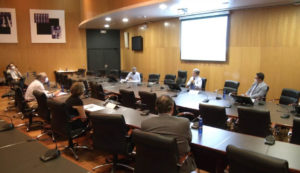
“The expansion projects of Valenciaport are essential to continue to be a reference port hub on the major commercial routes”
The railways, the motorways of the sea, respect for the environment, digitalisation and automation, keys to the future of ports and maritime logistics
Martínez stresses that “to remain competitive as a port hub we need the best rail connection”
Josep Vicent Boira says that the ports must have the infrastructure to operate 750-metre trains
The President of the PAV and the Government Commissioner for the Mediterranean Corridor have participated in the series of conferences on Mobility and International Trade in a Disruptive World by the Demetrio Ribes Chair
The President of the Port Authority of Valencia, Aurelio Martínez, has stated that “the great leading industry of the Valencian Community is logistics for the whole of Spain, and within it, Valenciaport plays a reference role. For this reason, it is necessary to invest on the growth of the Port so that logistics continues to be the great leading industry of our economy”. Martínez pointed out that “the economies need these driving forces, which on a global scale are the biotechnology, pharmaceutical, green energy and new materials industries, as well as the logistics industry which has Valenciaport as its strategic centre in Spain”.
The President of the PAV took part in the series of conferences organised by the Demetrio Ribes Chair of the University of Valencia with the paper The future of port logistics in the post-Covid-19 era within the framework of the Mobility and international trade in a disruptive world series in which the Government Commissioner for the Mediterranean Corridor, Josep Vicent Boira, also spoke with The future of the railway world in the post-Covid-19 era.
During his presentation, the President of the PAV explained that the world economic situation is producing and accelerating the processes of both horizontal and vertical business concentration, which also implies the concentration of cargo and that there are fewer and fewer hub ports. “This means that we have to be in the first division to be a reference and competitive by committing to new infrastructures, especially railway infrastructures that are very flexible and competitive. Valenciaport is well positioned due to its current size and the expansion projects it has to carry out, which would allow us to maintain our leading position in Europe. If we do not continue to improve our facilities, someone else will do so and economic activity will go elsewhere” he said.
The president of the PAV pointed out that in the Valencia Region “we already have a traction industry, the Port, let’s bet on it, and on multimodality and support for the large hubs currently in operation”. In this line, Martínez has valued the expansion plans of Valenciaport which include “the railway, the motorways of the sea, respect for the environment, digitalisation or the automation of processes”, fundamental objectives to continue being a reference point on the large commercial routes. In this sense, he indicated that “to continue being competitive as a port hub we need the best railway connection”.

The strategic maritime sector
In his presentation, Martínez reviewed the data on maritime traffic and the impact of the Covid-19 pandemic, where a recovery in traffic is observed in the third quarter and the reduction of the idle fleet to 2019 levels. During this period, shipping companies have adjusted their supply to the fall in demand and a greater concentration that will also affect loading and unloading operations in a few hub ports on the major maritime routes.
For the President of the PAV, “from a recent historical perspective, the growth of the world’s GDP has been based on international trade and this has used the container. Maritime traffic accounts for 90% of international trade”. Aurelio Martínez pointed out that maritime transport is the “most efficient means, whatever the variables used as energy expenditure per tonne and per km, volume, environmental sustainability or safety, among others”.
Martinez pointed out that since the end of May, cargo traffic (exports) and unloading traffic (imports) have not grown as much because consumption has standstill. He also pointed out that the percentage of ships stopped in the middle of the Covid-19 crisis was 10%, a figure which has fallen to 3% in the last two months. “These data are a sign of the recovery of world maritime traffic,” he stressed. For the President of the PAV in the coming years, “trade flows will continue to grow, although at lower rates, so the role of logistics will continue to be key. For this reason we must prepare ourselves to continue to be a strategic and reference point”.
For his part, Josep Vicent Boira indicated that “Spain has two great challenges, climate change and dependence on the global chain, which can be overcome by the increase in rail transport. The ports must have better rail connections and hallways for 750-metre trains”. For Boira, “we need to invest in infrastructure with greater added value, build a roadmap for the ecological transition in transport and set a goal to increase the use of rail for freight transport”.

